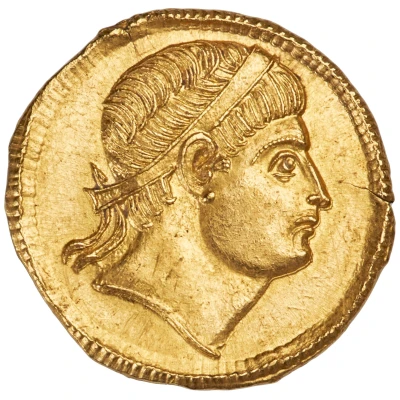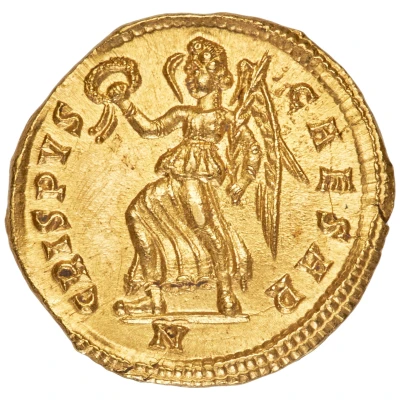


© Heritage Auctions
Solidus - Crispus CRISPVS CAESAR; Nicomedia
| Gold | 4.44 g | 20 mm |
| Issuer | Rome › Roman Empire (27 BC - 395 AD) |
|---|---|
| Emperor | Constantine I (Flavius Valerius Constantinus) (306-337) |
| Type | Standard circulation coin |
| Years | 325-326 |
| Value | Solidus (1) |
| Currency | Solidus, Reform of Constantine (AD 310/324 – 395) |
| Composition | Gold |
| Weight | 4.44 g |
| Diameter | 20 mm |
| Shape | Round (irregular) |
| Technique | Hammered |
| Orientation | Variable alignment ↺ |
| Demonetized | Yes |
| Updated | 2024-10-04 |
| Numista | N#381466 |
|---|---|
| Rarity index | 100% |
Reverse
Victory, winged, draped, advancing left, holding wreath in right hand and palm in left hand.
Script: Latin
Lettering:
CRISPVS - CAESAR
N
Comment
The eldest son of Constantine I, Flavius Julius Crispus inherited his father's charisma and military prowess, but fell victim to court intrigue before coming into his full inheritance. He was born, circa AD 295-305, as the only child of Constantine's liaison with one Minervina, probably his common-law wife. After his father became Caesar, Crispus could only watch as his mother was set aside (or perhaps she had died earlier) so Constantine could marry Fausta, daughter of Maximian. In late AD 316, Constantine raised Crispus to the rank of Caesar and began grooming him for the succession. In the early AD 320s, he oversaw campaigns against the Franks and Alemanni and he further distinguished himself as his father's naval commander against Licinius, in AD 324. Crispus was heaped with honors and seemed fully secure as Constantine's primary heir. In AD 326, he traveled to Italy to celebrate his father's 20th anniversary of rule (vicennalia). There, he apparently ran afoul of a plot hatched by his stepmother Fausta, who wanted to advance her own three sons in the succession arrangements. The nature of the plot remains obscure, but in the summer of AD 326, Crispus was abruptly arrested in the town of Pola, charged with some unspecified treasonous offense, and beheaded. Soon thereafter, Constantine ordered Fausta's execution by having her smothered in her steam bath. He supposedly later ordered a golden statue of Crispus erected and dedicated "to the son I unjustly condemned." The events of AD 326 so embittered Constantine that he never returned to Italy, and they may have played a role in his decision to move the imperial capital to Byzantium, soon renamed Constantinople.Alternatively, some historians believe the the trial and execution of Crispus was allowed by Constantine, in order to remove his son in order to retain power. Constantine may have promised, as Diocletian had earlier, to abdicate after twenty years of rule, and Crispus would have been the only one of his sons old enough to take over, as the others were only ten years old or younger.
Interesting fact
The Solidus - Crispus (CRISPVS CAESAR; Nicomedia) coin was issued during the reign of Emperor Crispus, who was the son of Emperor Constantine the Great. Crispus was known for his military campaigns and his efforts to restore the Roman Empire's economy and military strength. The coin was minted in Nicomedia, which was an important city in the Roman Empire at the time, and it features an image of Crispus on one side and a depiction of the goddess Victory on the other. The coin was made of gold and weighed 4.44 grams, making it a valuable and highly sought-after collector's item today.